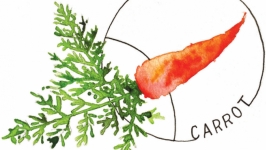Keep Your Food Safer and Cleaner
Dirt Crops, Clean Crops
Realistically, the success of food safety goes way beyond the formality of record on legislative books according to local farmer and owner of VanScoy Farms, Bill VanScoy’s general philosophy, a “working man’s” practicality shared by many of our farmers who are faced with aspects of food safety in their everyday lives.
“Food safety shouldn’t have to be about a bunch of rules and words on paper,” Bill says. “It should be a preventive, proactive approach instead of a reactionary approach. That’s how we look at it.”
Bill’s attitude towards food safety is played out in the daily operations of his farm’s CSA-supported culture where each business interaction is also an opportunity for agricultural education for both the farmers and consumers they work with.
He advocates for a more integrated and collaborative educational approach to food safety that incorporates a level of responsibility from all parties involved in the growing, packaging and handling of the food— including the consumer—who he thinks is often left out of the entire scope of the matter when legislation such as the FSMA is implemented.
“Everyone from the farmer to the consumer needs to be proactive and educate themselves on how to keep food safe,” Bill says. “Everybody is part of the process.”
One simple strategy VanScoy Farms practices, while also offering as a tip to consumers at the weekly farmers market, is to keep produce of different types separated when carrying them home to avoid any risk of contamination based on certain crops’ source of growth.
For example, Bill recommends not mixing your “dirt crops” like potatoes with your “clean crops” like lettuce, which is grown hydroponically and in a mostly contamination-free environment.
“We try to educate the consumer as we go along,” Bill says. “There are many potential access points in a food’s journey and every handler of the product has potential for custody as far as the risk for contamination.”







